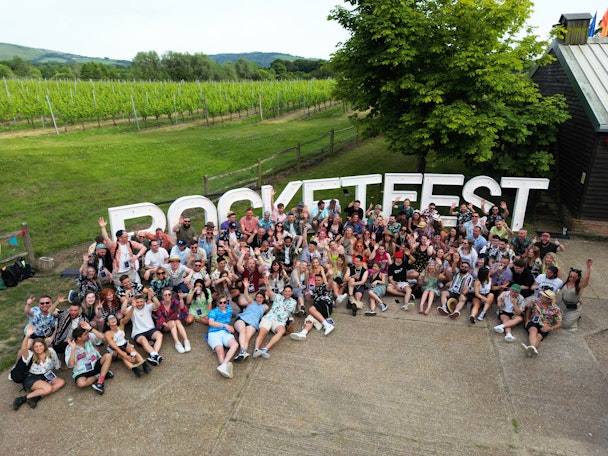RocketMill’s new chief exec wants employee ownership to spearhead diversity overhaul
Brighton-based digital marketing agency RocketMill is having a big year. In April, it won our digital marketing agency of the year gong among a raft of other awards; not long after, it bolstered its leadership team with new chief exec Tom Byrne, veteran of Periscopix, Merkle and Jellyfish. We sat down with Byrne to talk about plans to leverage employee ownership to tackle some of the industry’s most dogged problems.

RocketMill’s new chief exec tells us how the employee-owned agency plans to change the industry’s approach to diversity / Sharon McCutcheon via Unsplash
Digital marketing agency RocketMill was founded and built by brothers Sam and Ben Garrity in Brighton, on England’s south coast. But change is ahead. When we sit down with new chief exec Tom Byrne (Sam Garrity has moved to a chairman role), he’s waiting on an art delivery for a new office in London. It’s the first step in a UK-wide expansion that will also see offices in Leeds, Bristol and Edinburgh amid plans to expand its 150-strong workforce to 500, organically.
It would be wrong to call these Byrne’s plans, he tells us: since the agency is employee-owned, the direction of travel is decided by two boards, an agency board and a trust board, with employee representatives on each. “We’re not for profit; we’re for the benefit of the team (though profit is a component of that),” he tells us. So expansion priorities are driven by workers’ priorities – not least the desire for “career headroom”: “the driving force behind our growth is to ensure that everyone within the business has forward career opportunities to work in new types of environments, bigger clients, different jobs and different ecosystems.”
Algorithmic diversity
Another priority, again driven by employees, is to “change the make-up of the business to make ourselves more inclusive. The business is a reflection of Brighton, but it's not reflective of the UK.” For performance marketers in particular, he says, the responsibility to have diverse and representative teams is growing, with the risk of the implicit biases of dominant groups being compounded in the algorithms and digital tools that are taking on so much work in that space.
“As algorithms are controlling more of the decision-making within performance as a whole, there’s a risk of agencies creating echo chambers, because they don’t have a reflective range of perspectives that allow us to de-risk the way that we’re presenting information to the algorithm,” says Byrne. “If you present data, which has a myopic view, and you don’t have a full range of perspectives in terms of how you’re presenting the data to the algorithm, you are amplifying your bias.”
Geographical expansion, Byrne says, is key to this endeavor of diversifying algorithmic inputs along the axes of “social mobility, political bias, ethnicity, religion and neuro- and physical diversity.”
In 2022, few employers would not claim to value a diverse workforce. But that list is telling in its inclusion of social mobility; some employers in the industry still insist on a degree, or even a degree from an elite institution. “We want to be the absolute antithesis of [certain agencies’ approach of] ‘you have to have gone to Oxford and Cambridge,’” says Byrne. “I acknowledge that that gives reassurance to clients, but it doesn’t make you very accessible to a whole kaleidoscope of society.”
That means leaning heavily on an “academy structure” with a “strong bias toward people from less privileged backgrounds.” Here he namechecks YouTube phenomenon The $100 Race, in which an array of kids race on a field, but only after getting head starts according to the things that give people a leg up in life. His hope, and the hope of RocketMill’s decision-making workers, is to use “layers of pastoral care going into education and cultural support” to redress that balance.
The profit motive
It will be helped, Byrne says, by its ownership structure. While every organization at least pays lip service to diversity, they’re not always incentivized to follow through. “People try, but then they deprioritize it based on their commercial agenda. Ultimately, if you’re a for-profit organization, you will deprioritize things in order to make profit. We’re not. This is the ambition of the community. We have nothing else to do; if this is our service agenda, that’s because we think that it will enrich our community. If we’re working for the benefit of our community, that’s our goal.”
RocketMill, of course, does have commercial priorities – the difference is what it does with its profits. “What do we do with the commercial, with the value that we create, if we choose to reinvest that back in this? That’s our choice. The more money we make, the more we can invest in this.”
While working at one of his previous agencies, Byrne tells us, it tried to buy RocketMill – RocketMill went for employee ownership instead. Back then, he decided that it was “far and away the best” performance marketing agency in the UK. Since joining, he tells us, it’s the team as much as the performance that he’s been taken in by. “I don’t really think it matters what I do – it matters what I do it for and who I do it with.”
For the latest thinking from industry experts direct into your inbox every other week, sign up to The Drum’s Agency Insights newsletter.
Content created with:

RocketMill
Part of PMG, we are the UK's fastest growing, independent, full service agency, helping businesses grow through marketing performance. We have successfully united...
Find out more
